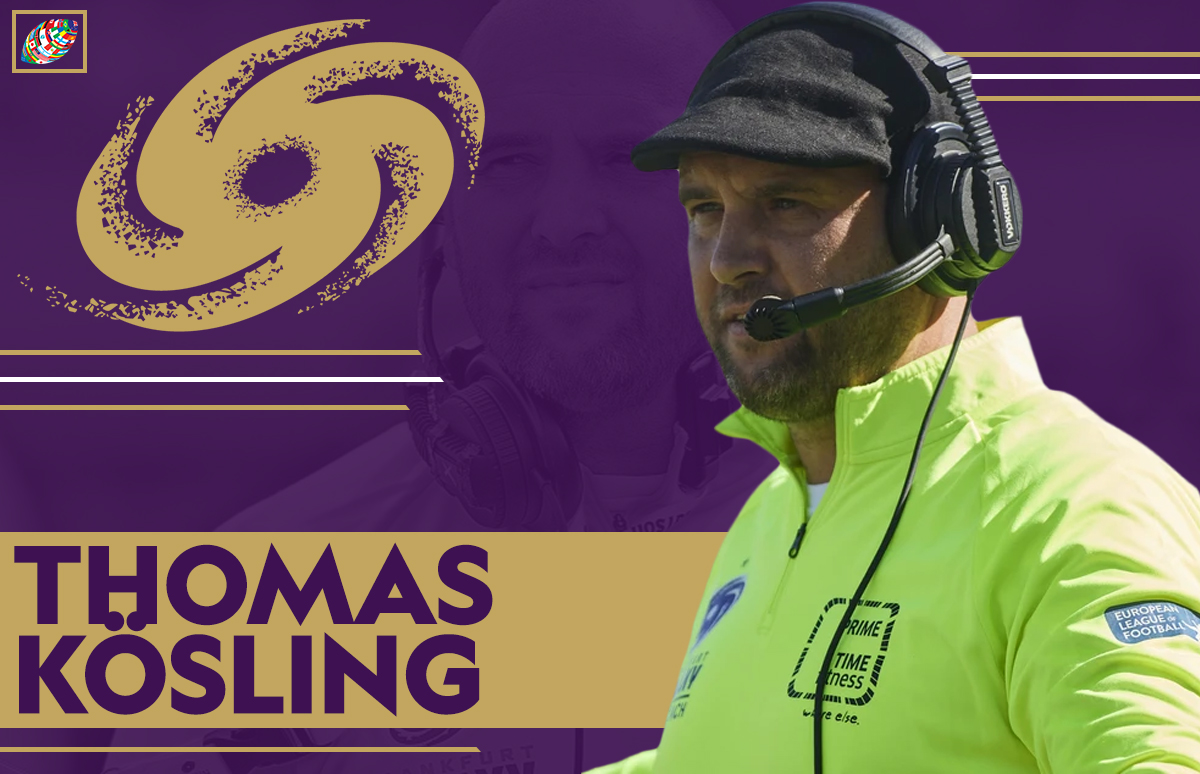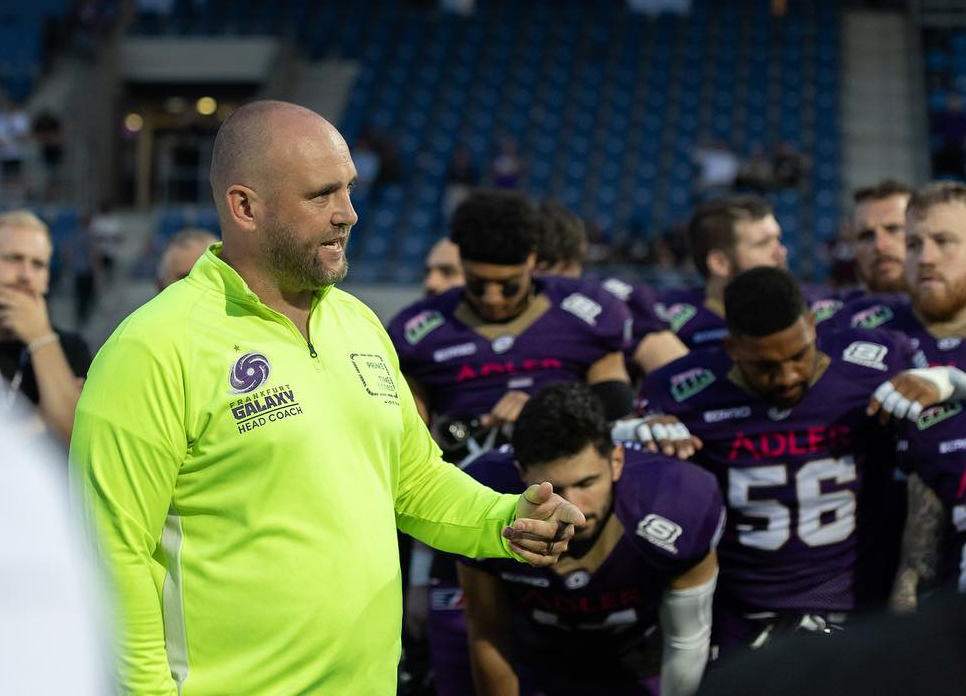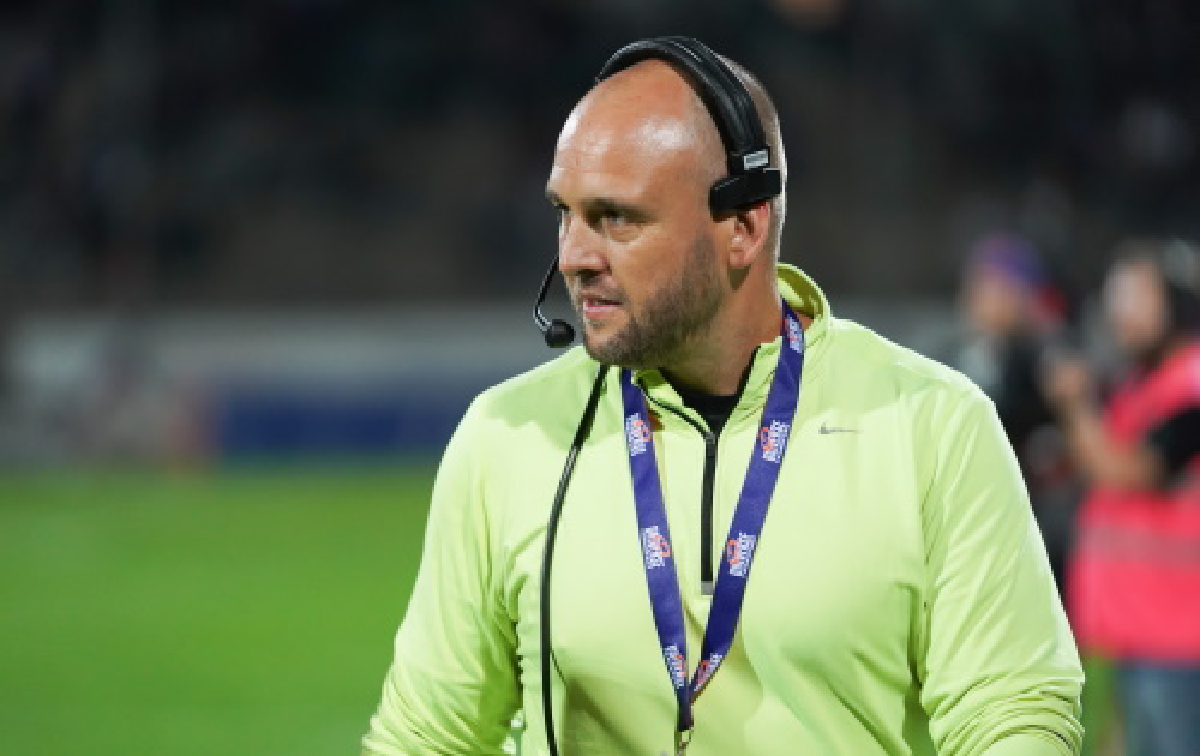Frankfurt Galaxy HC Thomas Kösling is unwavering in his belief in the league but thinks the toughest challenge still lays ahead

The Frankfurt Galaxy have struggled through their toughest season in the short history of the European League of Football.
The first ever champions of the ELF sit fifth in the six team ELF West conference with a 3-5 record. They have been eliminated from playoff contention and are now looking ahead to next season while finishing out this one. Their overall three-season record heading into 2024 was an astounding 30-8, so this is definitely a setback.
Still, head coach Thomas Kösling, who has been at the helm throughout all of this, remains undaunted.
The 41 year old native of Hainchen, Hessen, Germany actually stepped into the head coaching role in 2019 when he, as the defensive coordinator of the Frankfurt Universe of the GFL at the time, was asked to take over the former head coach Brian Caler who had to step away.
Since then, he has gone from strength to strength, first guiding the Universe to a semifinal spot in that 2019 GFL season and then taking over for the move to the ELF with the Galaxy. So if anyone can ride out the storm of this season, it would be Kösling.
AFI: You are in your fourth season as head coach of the Galaxy and have experienced all the highs and lows possible. This season has been a low so far. Still, with four games to go anything is possible. There is never any one factor but what kind of adjustments/changes do you feel you have to make?
Kösling: There are definitely more levels to it. On the field right now, it’s about taking it week by week, fighting through a very uncomfortable situation, because we started with high hopes and of course our aim was to reach the playoffs and play for a championship. It’s basically our first time in franchise history to be out of the race so early. We are working hard to finish strong and to end the season on a positive note, which will give us some confidence and build momentum for next year as well. You also learn a lot in these situations about players, their mentality. It’s important that we see who is willing to fight through adversity and who is not. That will also help us to make decisions moving forward in terms of building a roster that can compete again in 2025.
In the background, of course we discuss and analyze what went wrong, where we need to get better and where we need to change to improve ourselves. It’s about finding the right mix between, what made us successful the last three years and what kind of things we need to adjust, going in a different direction. It’s a very challenging time for the whole franchise but I really believe in the fact, that when you are able to fight through adversity, you can use this time and experience to get better in the future.
AFI: As one of the veteran coaches in the league, how much improvement/development have you seen in the ELF since 2021?
Kösling: The story of this League with the playing quality on the field is unmatched in Europe. It started with the goal to be the top league in Europe. The league improved every year at the playing and coaching level. I don’t think there was ever a better League founded in Europe with the base of European players than this before.
Of course, the development and the process of the league is not finished yet. There are teams and countries which are not as developed in American Football as others. That will take time but that’s part of the growing process and also part of finding out which parts of Europe can get in that direction to compete on the highest level.

AFI: The ELF has adopted the XFL kickoff rule which the NFL will now be using. Are there other rules changes you would like to see?
Kösling: I really like that the league is open to using rules from other leagues when there is a good reason behind it. Player safety should absolutely be the Number 1 reason to change rules, especially in Europe where as of now we not earning enough to build a life of that.
Other than that I think that leaning heavily on NFL Rules is a solid foundation to move forward.
In general i am not a big fan of going crazy with rule changings like for example going for it on a 4th and 20 instead of an onside kick or situations like that. I think that is more “Playstation football” and the sport should stick with the basic foundations that have helped build it.
At some point, you have simply lost a game and there should not always be a back door opportunity, like a five-point field goal or this 4&20 option available only to create artificial tension.
AFI: Do you have any suggestions for changes to improve the competitive balance in the ELF
Kösling: I think we need to be more flexible in terms of the import rules for the bottom four teams in the League. Why not allow the last four teams every year to have two Americans more on the roster or more imports in general to compensate for the gap between the top nations in Europe like Germany, Austria and France and the countries who are not as advanced in the development of professional American football. It’s like in the NFL with the Draft. The worst teams from the year before get to pick the first player. We could do the same with the American spots.
The most Import rule change in my opinion for the ELF to improve the level of football on the field for the whole league is to create an extra American import spot only for the offensive line. I would even go so far as to say that even two extra spots for American O-linemen would be awesome. This position group is the most important in football, but there is just not enough talent in Europe to cover all these positions for all the teams.
You need 10-12 offensive linemen for the season. Where should these 170 players come from? The difference at this position between the top teams and the bottom of the League is so enormous that this is a problem. And even for the top teams it’s tough to have quality depth at this position without signing two import O-linemen. You would easily stabilize a position which is very problematic for all teams but is so important to be able to play competitive football. I hope the league will go that direction and I know that many coaches and franchises are totally in favor of it.
AFI: No one may be better qualified to answer this question – How much do you feel that the ELF has changed the landscape of football in Europe?
Kösling: It’s a very interesting but also difficult question: First of all, the talent in Europe has always been there and the teams and franchises in the many of the countries are doing a great job in providing an opportunity for kids and players to learn the sport and get better. From that prospective, it is not like the ELF invented football or changed something. But every domestic League like German Football League or Austrian Football League, hit limits in growing and developing the game outside of the small Football world in their own contries, due in part to lack of funding and also relevance within their own nations.
The ELF created a plattform that crushed through that wall of irrelevance. It’s the first time a league that was founded in Europe has become so competitive and gained such a high profile in both the regular media and social media world that you can see a spike in interest from people all over Europe and even in the United States. For thee first time, it feels like a European football league actually matters and people recognize it. More and more people watching the games. The last championship game was sold out with over 30.000 people in the stands and the next one will have around 35-40.000 fans in one of the biggest stadiums in Europe. The media presence is much bigger than ever and more people are getting involved. Fan bases are growing. The interest and respect this league earns by its level of play and quality of output is unmatched. The players are finally getting well deserved recognition for their play which provides satisfaction and another motivational push to become better in this sport because people now care about the results and what’s happening.

Photo: Chris Hahn
NFL coaches like Jim Tomsula, Norm Chow and Rip Scherer are involved in this league and many more will come because this league creates a opportunity to be part of a great Adventure but also because the ELF is a legit football league.
More and more businessmen are investing in the franchises because the general interest in American football is higher than ever but. also, for the first time, the vision of creating a Pro league in Europe hs truly gained traction.
Of course there are growing pains and many things are far from perfect but when you look back to 2021 when most people thought this league was going to be a one year wonder, things have certainly changed.
The ELF arrived at the right time and it was a now or never moment for creating such a league in Europe. However, I think the biggest and toughest challenge is still ahead of us.
Like the GFL and the other regional leagues, the ELF is about to hit some hurdles too. The time and the investment that players, coaches, referees and also general managers are putting in is at a maximum of what you can do at an amateur/semi pro level. With all the travel, the intensity of the game and with more and more money involved, the next step has to be taken. This is to totally professionalize the sport in Europe. That means more investment in training facilities, having full time coaches, players and referees and upgrading many many other aspects around the sport. This is only possible with money from major sponsors, TV and with more fans packing into stadiums and supporting their teams by buying tickets and merchandise. The costs for every franchise right now are not sustainable in my opinion for the next three years if nothing changes on the financial side.
I’ve always maintained that in the first three years, the ELF, to be able to continue, needed to establish a product and a quality of play that is far better than the rest of Europe. We’ve done that. Now, it’s time to establish a solid income stream for franchises to professionalize the product and provide a solid structure for all franchises who are participating. This is a tough challenge but only if that happens do I think that this league can survive and become hopefully at one point a truly professional football League in Europe which will give all the young kids another opportunity to play this great sport on a very high and professional level.
